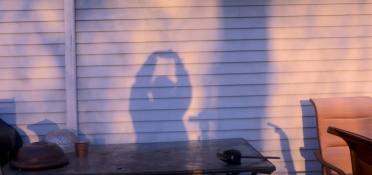Wednesday, July 15, 2020
I remember each furrow of your hand : even as I recite each line of your book.
On the flyleaf, my grandfather's signature is well rendered with a fountain pen. A gesture of holding. I mull over his calligraphy from fifty years ago: his name, three characters of cursive script pouring, splashing like the sparse trace of bamboo. The ink is blue-black, the leaves yellowing. The kind of colors that take half a century to precipitate and fade. He once told me, In the distance, the southern hills discuss whether to give a rain. Now I mimic his calligraphy with rain of dots and strokes: the dash that drips like a peony dew, the slant skimming like a sword, shielded with solstice snow. I’m no good at those techniques after all: Strange Stone, Jade Table, Iron Pillar, Pincer of a Crab, Tiger’s Tooth, Horn of Rhinoceros, Bird Pecking, and Golden Knife. I hold my breath, wrestle line by line. Within the structure of characters, strokes take breath from one another, rendezvous like lifelines on my palm-print. Now that I have taken time to practice I realize how differently we write the sole same character in our names, our surname, with different stroke order, different pauses on edges, and different degrees of curves. It seems we are mismatched by our surname, the gesture of holding generations of belongings in four cursive strokes: Strange stone, Jade table, Horn of rhinoceros, and Golden knife. When I flip the leaves, the book sends forth—autumn, I think. It’s the autumn during the Cultural Revolution when my grandfather met his girl.
Strange Stone : dashed too thick
You were sent to the far north. You were among intellectuals targeted by the Red Guards. In the rural labor camp, she gave you two babies: a boy and a girl.
Jade Table : stroked too stale
You stamped out a forest fire, your hands burnt, trembled for the rest of your life. You couldn’t pick up calligraphy. Since then, your brush pens were stranded like August branches, drooping with osmanthus blossoms. That spring, I watched your desolate inkstone slowly infuse with pear blossom rain. You stood by the window. Said nothing.
Horn of Rhinoceros : skimmed too thin
For the rest of your life, you hid a box of candy under your pillow. She had hypoglycemia. You planted a garden of peony for her. You said, The peony is all about waiting, and that is the reason they bloom like lanterns, beaconing for the return.
Golden Knife : too sharp
You loved poetry, a terrible hobby. You embezzled the money for candy, bought a secondhand Du Fu collection, bargaining all afternoon. You got hustled. How I remembered you laughed and clapped when I recited Lu You’s poem. I’d never seen you so proud, reticent man. Too soon, you boarded the forgetful boat, having not read one poem I wrote.
The name no longer uttered : always remembered.
I flatten the folded page of the book, then refold it, to trace your warmth. It’s gone. Those last days in the white hospital room, your palm swelled, tender as a ripened fruit, or the flipping pages of a fallen book. Your palm swayed and swayed like a landing crane beside the snowy bedsheets. With a last tremor of warmth you stroked my cheek—finishing your final calligraphy. Listen, reticent man, here, I recite my poem for you.
Wednesday, July 15, 2020



